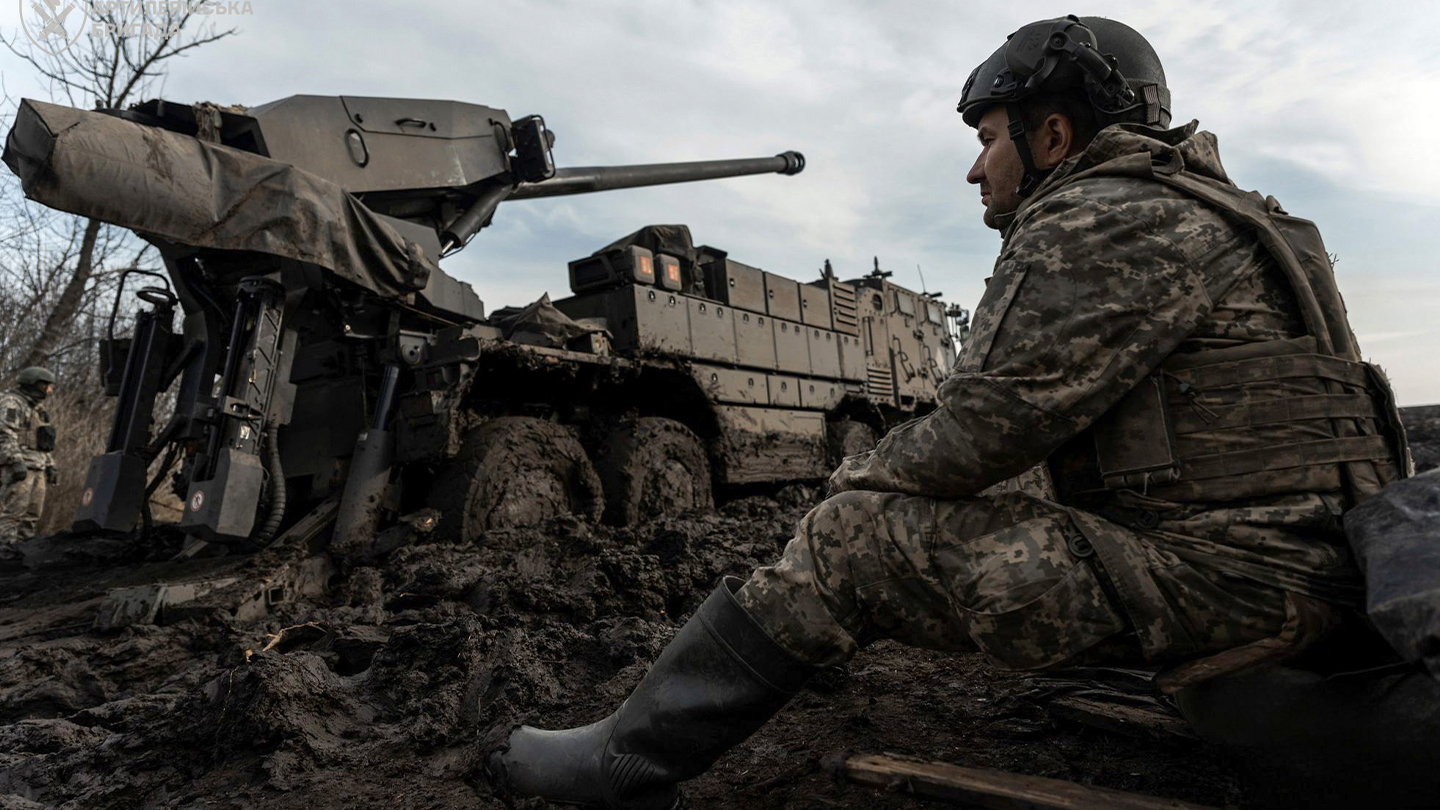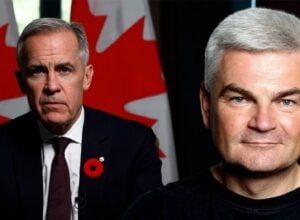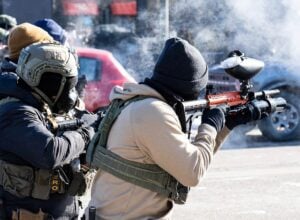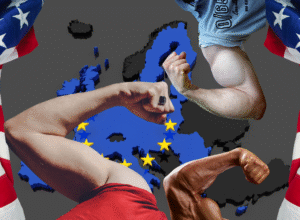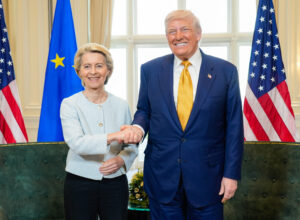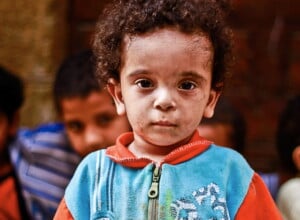Minął rok, odkąd porzuciłem pracę dydaktyczną i biblioteczną, aby służyć w Siłach Zbrojnych Ukrainy. Myślę, że w związku z tym warto chwilę zastanowić się nad osobistymi „zdradami” i „zwycięstwami”, zaletami i wadami, jednym słowem podsumować wyniki roku.
Notatka I. Niezapomniany rok
Na początku chcę zaznaczyć, że nie miałem żadnego doświadczenia w służbie wojskowej – w czasach studenckich ominęły mnie wszelkie szkolenia, a przez cały pierwszy rok pełnoskalowej wojny byłem zwolniony ze służby, ponieważ pracowałem jako nauczyciel. Postanowiłem jednak, że chcę się zmobilizować. Jako ochotnik dołączyłem do nowo utworzonej brygady zmechanizowanej i z dwunastu miesięcy spędziłem osiem w strefie działań bojowych na różnych częściach frontu.
Motywacją do mobilizacji, podobnie jak u wielu innych osób, była dla mnie wiara w swego rodzaju mit o kontrofensywie. Oczywiście rozumiałem, że wojna będzie trwała, być może nawet latami, ale miałem nadzieję, że w ciągu sześciu miesięcy osiągniemy nowe kamienie milowe. Dlatego chciałem wziąć udział w tych prawdziwie historycznych wydarzeniach. Miałem okazję być w jednym z odbitych punktów na tak zwanym kierunku Szachtarskim – znajdował się on wtedy 10 kilometrów od poprzedniej linii styku, teraz został ponownie zdobyty przez wroga.
Ten rok dał mi przede wszystkim niezapomniane przeżycie czynnego udziału w wojnie, która (na szczęście?) nie jest losem każdego pokolenia. Jak wielu chłopców, jako dziecko marzyłem o wzięciu udziału w prawdziwej strzelaninie (oczywiście na pozycji wygranego). Jak to mówią: marzenia się spełniają, choć niestety nie każdemu przynoszą szczęśliwe zakończenie.
Kiedyś powiedziałem żonie, że psychicznie i fizycznie łatwiej jest spędzić noc pod ostrzałem artyleryjskim niż siedzieć przy łóżku chorego dziecka, któremu nie spada temperatura. „Nie wiesz, jak to jest siedzieć pod ostrzałem” – odparła wówczas moja żona. Teraz mogę śmiało powiedzieć, że rzeczywiście – jest łatwiej.
Do innych zalet służby wojskowej mogę zaliczyć poprawę sprawności fizycznej (choć w moim przypadku faktyczny wysiłek fizyczny w wojsku okazał się mniejszy niż w życiu cywilnym), bezpłatne wyjazdy w różne nieznane mi wcześniej zakątki Ukrainy (głównie w obrębie dawnych Dzikich Pól) i oczywiście pieniądze. W tych oddziałach, gdzie sprawami finansowymi zajmują się wykwalifikowani i wykształceni ludzie, służba wojskowa pozostaje szybką społeczno-ekonomiczną windą zarówno dla prekariatu, jak i dla tradycyjnej, nieopływającej w dostatki inteligencji.
Jednak przy tych wszystkich zaletach nadal nie mogę się zdecydować, czy decyzja o mobilizacji nie była błędem. Główną i wszechobecną wadą, która niweluje prawie wszystkie „plusy”, jest rozłąka z rodziną i dziećmi. Kierowcy ciężarówek i żeglarze muszą mi wybaczyć, ale ja nigdy nie chciałem takiego zawodu. Nieprzyjemny efekt potęguje niepewność, jak długo to wszystko będzie trwało. To oczywiste, że projekt ustawy nr 10449 nie rozwiąże kwestii demobilizacji, gdyż możliwość zwolnienia do rezerwy po i tak kolosalnym okresie 36 miesięcy uzależniona jest od dodatkowych, nieprzejrzystych warunków.
Stałem się też znacznie mniej wrażliwy na ludzką krzywdę i niesprawiedliwość. Gdy wszyscy są wrzuceni do jednego worka i nie masz nawet czasu, by zapamiętać nazwiska rekrutów znajdujących się w trudnej sytuacji społecznej, którzy są mieleni i pozostawiani na pastwę losu przez kolejne oddelegowanie do jednostki szturmowej, empatia stopniowo zanika. Można jedynie próbować racjonalizować rozkazy wyższego dowództwa, aby zapobiec nowym stratom.
Chociaż znalazłem się w niezwykle przyjaznym środowisku wśród całej milionowej armii, bez nadmiernego wymuszania męskości, moja własna motywacja do ochrony kraju po tym, co zobaczyłem w armii, została poważnie nadwątlona. Jak słusznie powiedział jeden z moich towarzyszy, nasz sukces w 2022 roku wynikał z tego, że w ukraińskiej armii ludzi, którym zależy, jest o ułamek więcej – ale tylko ułamek. Ale wielu z tych ludzi już nie ma, a część jest przywiązana do bezsensownej papierkowej roboty, którą co prawda można dobrze wykonać, ale której nie da się pokochać.
Notatka II. Kto jest właścicielem życia obywatela?
Na podstawie tego, co widziałem, słyszałem i przeżyłem, chcę bardziej szczegółowo skupić się na zagadnieniu, które jest dziś głównym tematem dyskusji publicznych w Ukrainie. Dlaczego na początku pełnoskalowej inwazji pod „komisariatami wojskowymi” ustawiały się kolejki ochotników, a pod koniec drugiego roku wojny tragikomiczna konfrontacja tzw. uciekinierów z pracownikami Terytorialnych Ośrodków Rekrutacji i Wsparcia Społecznego stała się jednym z najpoważniejszych problemów społecznych?
Kwestię tę podnosi między innymi słynny ukraiński filozof Andrij Baumeister, przekładając ją na kontekst rozmowy o granicach uzasadnionej przemocy w państwie demokratycznym, a także o różnicach między statusami „poddanego” i „obywatela”. Mimo całej dwuznaczności wypowiedzi Baumeistera trudno się z nim nie zgodzić w tym konkretnym aspekcie: w ciągu półtora roku wojny coś się zmieniło nie tylko w sytuacji operacyjnej na froncie, ale też w samym społeczeństwie ukraińskim.
Jako osoba z wykształceniem historyka zauważam, że wojna masowa (a nawet totalna) z mobilizacją setek tysięcy lub milionów ludzi jest zjawiskiem stosunkowo nowym. Ołeksandr Szulman, który dla „Army Inform” napisał niewielki, ale treściwy artykuł na temat praktyk mobilizacyjnych w przeszłości, na początku stawia niezwykle wątpliwą tezę, że „obowiązek wojskowy pojawia się wtedy, gdy pojawia się państwo”, potem jednak podaje różne przykłady z początku XIX wieku i późniejsze. Przykłady zaczerpnięte z czasów wcześniejszych wyraźnie nie dotyczą mobilizacji we współczesnym tego słowa znaczeniu, ale zawodowej grupy wojskowej – rycerzy, dworzan, szlachty, czy też bellatores w terminologii europejskiego średniowiecza. Osoby te, których liczba łącznie z członkami ich rodzin nigdy nie przekraczała 10 proc. całego społeczeństwa, miały odrębny status prawny, który był dziedziczony i któremu przypisywano cechy Boskiego Porządku. Godnym uwagi wyjątkiem może być prawo mobilizacyjne w Republice Rzymskiej, która pod pewnymi względami przypominała współczesne społeczeństwo.
W epoce Oświecenia, kiedy w Europie szerzyły się idee równości ludzi wobec prawa, jeden z czołowych francuskich myślicieli tamtych czasów Jean-Jacques Rousseau w słynnym traktacie Umowa społeczna, czyli zasady prawa politycznego wyraził nienaganną logicznie, ale niezwykle przerażającą tezę:
„Obywatel nie jest już całkiem sędzią niebezpieczeństwa, na które prawo chce, by się naraził; i gdy doń książę mówi: »Korzystnie jest dla państwa, byś umarł«, winien umrzeć, skoro pod tym tylko warunkiem żył dotychczas w bezpieczeństwie i skoro życie jego nie jest już tylko dobrodziejstwem przyrody, lecz warunkowym darem państwa”.
Chociaż Rousseau jest znany jako filozof raczej liberalny, stwierdzenie to wydaje się leżeć u samych podstaw odrażających, a nawet krwiożerczych działań reżimów, które nazywały siebie „demokratycznymi”, „komunistycznymi” lub „narodowo-socjalistycznymi”.
Czy dzisiaj, wybierając władzę ustawodawczą i wykonawczą, rzeczywiście zgadzamy się, że nasz dobrobyt, ciało i samo życie są darami od państwa, którymi może ono dowolnie dysponować?
Notatka III. Perspektywy ukraińskiej mobilizacji
W kontekście omawianego zagadnienia tezę tę można odrzucić tylko w jeden sposób: podważając istniejący obecnie w opinii publicznej związek mobilizacji ze śmiercią lub niepełnosprawnością. To połączenie oczywiście nie wzięło się znikąd. Od ponad dwóch lat pełnoskalowa wojna dotyka w ten czy inny sposób każdego mieszkańca Ukrainy, a prawie każdy ma znajomych, którzy zginęli lub zostali ciężko ranni podczas walk.
Z drugiej strony szerzą się pogłoski o swawoli dowódców, nieprzemyślanych operacjach i bezsensownych rozkazach. Pogłoski te również często nie pojawiają się znikąd, chociaż ich absolutyzacja jest bezsensowna i po prostu błędna; ponadto idea rzekomo szerzącego się charakteru tych zjawisk w armii ukraińskiej jest stale wykorzystywana przez propagandę wroga.
Aby podważyć to powiązanie (całkowite jego zerwanie w dalszym ciągu nie jest możliwe), należy zreformować system rekrutacji, co powoli dzieje się w poszczególnych jednostkach poprzez wprowadzenie gwarantowanych szkoleń bojowych i upowszechnianie informacji o rzeczywistej liczbie specjalności pozabojowych w armii.
Jednak jednym z najskuteczniejszych działań na drodze do racjonalizacji i humanizacji spraw wojskowych byłoby, moim zdaniem, ustalenie jasnych warunków służby dla zmobilizowanych. Kontrargumenty w stylu „nikt nie może wiedzieć, jaka będzie sytuacja na froncie za jakiś czas” są zupełnie pozbawione sensu, gdyż nie wszyscy żołnierze chcą być zdemobilizowani, a ze względu na znaczną liczbę niezmotywowanych i nieprzygotowanych rekrutów sytuacja na froncie nie ulegnie poprawie (chyba że dowódcy postanowiliby naśladować najgorsze praktyki okupantów, czyli tzw. wykorzystanie „mięsa armatniego”).
Z drugiej strony problemy te mają jeszcze bardziej złożony charakter, gdyż jeśli zmotywowany i dobrze przygotowany człowiek wejdzie do wojska, a tam spotka sierżanta alkoholika lub przydzielonego oficera wrzeszczącego tylko „naprzód, naprzód”, to z motywacji (a czasem i ze szkolenia) rekruta wkrótce już nic nie zostanie. Reformy wymagają zatem również stosunki wewnątrz armii, które nie zawsze da się uregulować ustawą czy regulaminem.
Istnieją też inne czynniki, które prowadzą kwestię mobilizacji w ślepy zaułek.
Po pierwsze, przypadki arbitralnego zachowania pracowników Terytorialnych Ośrodków Rekrutacji i Wsparcia Społecznego rzeczywiście mają miejsce i są rejestrowane na wideo. Jeśli nie są to celowe prowokacje grupy dywersyjnej wroga, mające na celu zdyskredytowanie ukraińskich żołnierzy, to nie wiem, jak to nazwać. Podczas ostatniego urlopu w rodzinnej Odesie, kiedy szedłem ulicą lub jechałem komunikacją miejską w mundurze wojskowym, dosłownie czułem podejrzliwe spojrzenia przechodniów: „Może on rozdaje wezwania?”. A ty właśnie przyjechałeś z miejsca, w którym wiecznie płoną hałdy i musisz wkrótce tam wrócić. Robi to po prostu okropne wrażenie.
Znany pisarz Artem Czapaj zauważa, że w skład Terytorialnych Ośrodków Rekrutacji i Wsparcia Społecznego często wchodzi personel wojskowy, ranni i zwolnieni z jednostek bojowych. Trudno sobie wyobrazić, jak może to być usprawiedliwieniem (boję się pisać – „wyjaśnieniem”) brutalnych działań części pracowników, czy mobilizacji epileptyków, których również osobiście spotykałem w armii.
Po drugie, istnieją media i „liderzy opinii publicznej”, którzy dosłownie demonizują „uciekinierów” – zwyczajnych ludzi, którzy pod wpływem nieuporządkowanego przepływu informacji, plotek i doświadczeń znajomych boją się zmienić swoje życie cywilne na codzienne życie w okopach.
Wspomniany już Artem Czapaj wyraża także inny, poważniejszy argument za maksymalną mobilizacją, aczkolwiek wyłącznie metodami prawnymi: jeśli żyjemy w państwie demokratycznym, jeśli jesteśmy równi wobec prawa, to ciężar służby wojskowej powinien w równym stopniu spadać na co najmniej kwalifikującą się populację mężczyzn. Argument ten zakłada jednak kilka ważnych warunków wstępnych: ustanowienie jasnych i odpowiednich warunków świadczenia służby (za czym sam Czapaj wyraźnie się opowiada) oraz wykorzystanie personelu ściśle według obowiązków pracowniczych (czy wszyscy powinni po równo dzielić los zwiadowców lotniczych i żołnierzy wysyłanych na szturm?).
Inaczej mówiąc, wojsko w pracy kadrowej musi kierować się znaną zasadą „od każdego według jego możliwości, każdemu według jego potrzeb”; musi znaleźć odpowiednie podejście i zapewnić godne wykorzystanie ludzi według poziomu ich wiedzy i umiejętności, dodatkowo dając możliwość dołączenia do wojska wszystkim, którzy są do tego chętni i zdolni.
Rozwiązania całego tego węzła sprzeczności poważnie utrudnia fakt, że nie znamy prawdziwych potrzeb Sił Zbrojnych Ukrainy pod względem kadrowym. Pod koniec grudnia 2023 roku w mediach pojawiła się informacja o „konieczności zmobilizowania 500 tys. obywateli”, jednak były naczelny dowódca Sił Zbrojnych Ukrainy Wałerij Załużny zaprzeczył, jakoby taka liczba była przekazywana do rozpatrzenia przez polityczne kierownictwo państwa.
Plany uzupełnienia armii są tajemnicą wojskową, co jest zrozumiałe. Jednak jako ludzie pracujący w wojsku wiemy na pewno, że jest wielu takich, którzy już dawno powinni zostać zwolnieni ze względu na stan zdrowia. Jest wielu rannych, okaleczonych i po traumie, których uznaje się za „w najlepszym wypadku o ograniczonej sprawności”, którzy nie mogą już wykonywać zadań bojowych, a do zadań sztabowych nie mają wystarczających kwalifikacji i umiejętności. Przez miesiące uważa się ich za „personel poza stanem” i siedzą na tylnych „dyspozycjach” z obniżoną pensją, bez możliwości swobodnego przemieszczania się lub znalezienia innej normalnej pracy. Po co trzymać w wojsku tych ludzi, którzy poświęcili już dla ojczyzny swoje zdrowie, pozbawiając ich możliwości utrzymania rodziny i „gospodarki”? Po co trzymać w wojsku osoby, które mogłyby zasilić miejsca pracy, na które od dawna nie można znaleźć pracowników?
Jednym ze sposobów rozwiązania tego problemu mogłaby być alternatywa dla służby wojskowej w przemyśle obronnym lub innych gałęziach przemysłu wspierających obronność kraju. Pomogłoby to również w zmniejszeniu stopy bezrobocia, której wzrost spowodowany był pełnoskalową inwazją. Ale czy jest ku temu wola polityczna? Czy łatwiej jest zmobilizować nieprzeszkolonych żołnierzy niż znaleźć zatrudnienie dla wyszkolonych i doświadczonych pracowników? Pytania te pozostają otwarte.
Ostatnią cegiełką w rozwiązaniu kwestii mobilizacji mogłaby być reorientacja ukraińskiej propagandy z demonizacji i dehumanizacji wroga (a także znacznej części współobywateli!) na jasny obraz tego, o co i przeciw czemu walczymy. Rosyjski imperializm naprawdę ma potworne cechy, z którymi mogą utożsamiać się tylko maniacy: połączenie kapitału oligarchicznego ze służbami specjalnymi, arbitralność sił bezpieczeństwa, cenzura w internecie, paranoiczna fiksacja na postaciach i wydarzeniach z przeszłości, władza sprawowana „silną ręką” i wiele więcej. Jeśli obywatel zda sobie sprawę, że Siły Zbrojne Ukrainy walczą o ustrój demokratyczny, pluralizm opinii i wartości, przynajmniej równość wobec prawa, nie dotknie go wyniszczająca myśl „tu jest tak samo jak tam – po co walczyć”.
W lutym i marcu 2022 roku miliony zwykłych mężczyzn i kobiet, wychowanych na tych samych sowieckich komediach, rosyjskim rocku czy rapie, dowcipach o Estończykach i Czukczach, wyszło, by bronić swoich domów i rodzin przed brutalną agresją Kremla. Zwykli robotnicy kołchozów, kurierzy i hutnicy, wcale nie indoktrynowani przez nacjonalizm „Doncowa”, byli gotowi udusić i poćwiartować najeźdźców po prostu dlatego, że bezczelnie najechali nasz kraj. Jak wynika z moich prywatnych rozmów, wielu miało nadzieję, że pod wpływem tego „ekstremalnego stresu” Ukraina zasadniczo się zmieni, pozbywając się skorumpowanej kleptokracji (i być może oligarchii). Nie stało się jednak tak, jak oczekiwano. Zamiast realnych zmian społeczno-politycznych, mobilizacji w imię istotnych pozytywnych wartości, takich jak własny dom, wolność i równość obywatela, władze starają się mobilizować ludzi poprzez strach.
Rozumiem, że nie każdemu przypadną do gustu moje rozważania – zarówno niektórym wojskowym, jak i cywilom. Mnie również nie podoba się ta publiczna dyskusja. Jednak dla wielu jest to bolesny temat. Moje osobiste rozczarowanie realiami wojska przyszło po pierwszych dwóch, trzech tygodniach służby, potem wojskowa codzienność przyniosła swego rodzaju stabilizację, po czym znów pojawił się niepokój i irytacja (na szczęście nadszedł czas urlopu). W tej chwili widzę w służbie pewne perspektywy, choć może to jednak po prostu typowy „błąd ocalałego”.
Chciałbym mieć nadzieję, że ten rok służby będzie ostatnim, jednak wiem, że ten koniec przyjdzie dopiero wtedy, gdy rosyjski imperializm połamie sobie na nas zęby. Warunkiem tego powinno być przezwyciężenie najostrzejszych problemów wewnętrznych ukraińskiego społeczeństwa, które niekiedy prowadzą do pesymizmu bardziej niż sytuacja operacyjna na froncie.
**
Walenty Dołhoczub – doktor filozofii w zakresie historii i archeologii, nauczyciel w gimnazjum w Gulajowie.
Tekst opublikowany w serwisie commons.com.ua. Z ukraińskiego przełożyła Aleksandra Kosior.

 Wspieraj
Wspieraj 

 Wspieraj
Wspieraj  Wydawnictwo
Wydawnictwo 
 Zaloguj się
Zaloguj się 